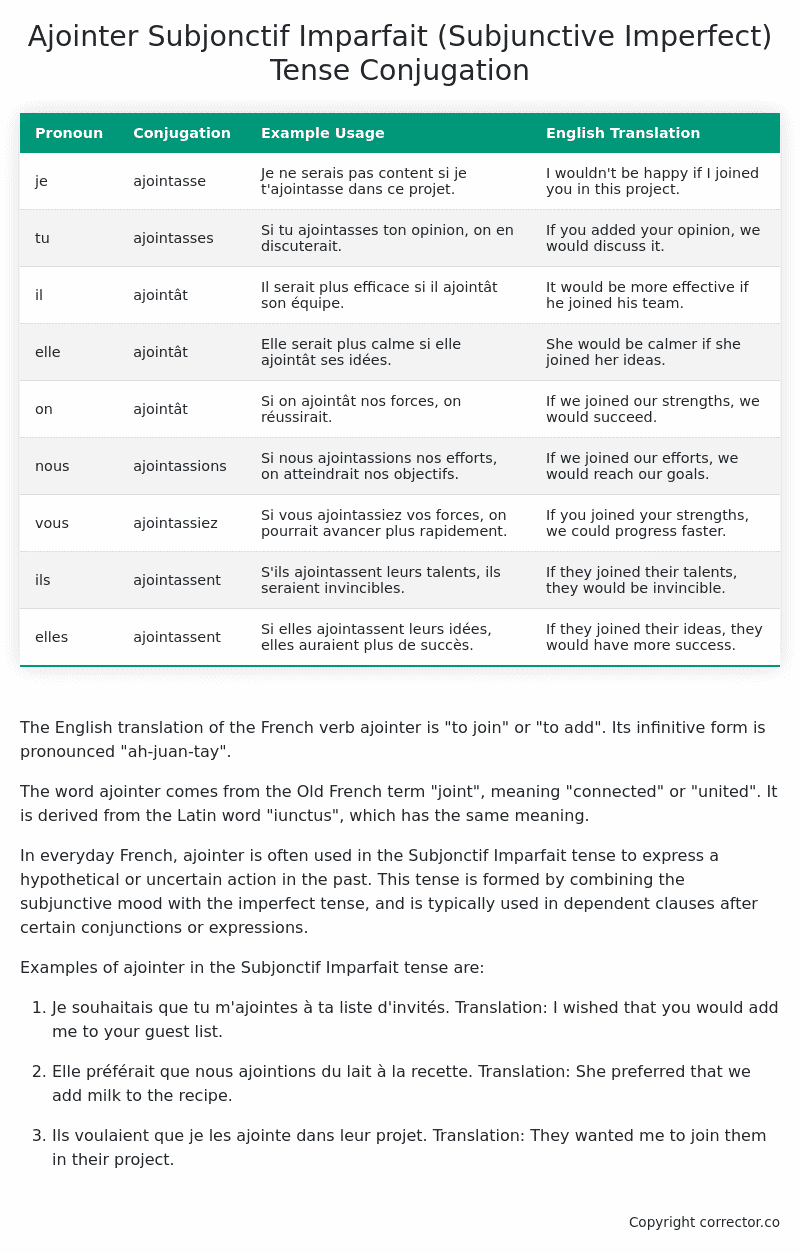Subjonctif Imparfait (Subjunctive Imperfect) Tense Conjugation of the French Verb ajointer
Introduction to the verb ajointer
The English translation of the French verb ajointer is “to join” or “to add”. Its infinitive form is pronounced “ah-juan-tay”.
The word ajointer comes from the Old French term “joint”, meaning “connected” or “united”. It is derived from the Latin word “iunctus”, which has the same meaning.
In everyday French, ajointer is often used in the Subjonctif Imparfait tense to express a hypothetical or uncertain action in the past. This tense is formed by combining the subjunctive mood with the imperfect tense, and is typically used in dependent clauses after certain conjunctions or expressions.
Examples of ajointer in the Subjonctif Imparfait tense are:
-
Je souhaitais que tu m’ajointes à ta liste d’invités.
Translation: I wished that you would add me to your guest list. -
Elle préférait que nous ajointions du lait à la recette.
Translation: She preferred that we add milk to the recipe. -
Ils voulaient que je les ajointe dans leur projet.
Translation: They wanted me to join them in their project.
Table of the Subjonctif Imparfait (Subjunctive Imperfect) Tense Conjugation of ajointer
| Pronoun | Conjugation | Example Usage | English Translation |
|---|---|---|---|
| je | ajointasse | Je ne serais pas content si je t’ajointasse dans ce projet. | I wouldn’t be happy if I joined you in this project. |
| tu | ajointasses | Si tu ajointasses ton opinion, on en discuterait. | If you added your opinion, we would discuss it. |
| il | ajointât | Il serait plus efficace si il ajointât son équipe. | It would be more effective if he joined his team. |
| elle | ajointât | Elle serait plus calme si elle ajointât ses idées. | She would be calmer if she joined her ideas. |
| on | ajointât | Si on ajointât nos forces, on réussirait. | If we joined our strengths, we would succeed. |
| nous | ajointassions | Si nous ajointassions nos efforts, on atteindrait nos objectifs. | If we joined our efforts, we would reach our goals. |
| vous | ajointassiez | Si vous ajointassiez vos forces, on pourrait avancer plus rapidement. | If you joined your strengths, we could progress faster. |
| ils | ajointassent | S’ils ajointassent leurs talents, ils seraient invincibles. | If they joined their talents, they would be invincible. |
| elles | ajointassent | Si elles ajointassent leurs idées, elles auraient plus de succès. | If they joined their ideas, they would have more success. |
Other Conjugations for Ajointer.
Le Present (Present Tense) Conjugation of the French Verb ajointer
Imparfait (Imperfect) Tense Conjugation of the French Verb ajointer
Passé Simple (Simple Past) Tense Conjugation of the French Verb ajointer
Passé Composé (Present Perfect) Tense Conjugation of the French Verb ajointer
Futur Simple (Simple Future) Tense Conjugation of the French Verb ajointer
Futur Proche (Near Future) Tense Conjugation of the French Verb ajointer
Plus-que-parfait (Pluperfect) Tense Conjugation of the French Verb ajointer
Passé Antérieur (Past Anterior) Tense Conjugation of the French Verb ajointer
Futur Antérieur (Future Anterior) Tense Conjugation of the French Verb ajointer
Subjonctif Présent (Subjunctive Present) Tense Conjugation of the French Verb ajointer
Subjonctif Passé (Subjunctive Past) Tense Conjugation of the French Verb ajointer
Subjonctif Imparfait (Subjunctive Imperfect) Tense Conjugation of the French Verb ajointer (this article)
Subjonctif Plus-que-parfait (Subjunctive Pluperfect) Tense Conjugation of the French Verb ajointer
Conditionnel Présent (Conditional Present) Tense Conjugation of the French Verb ajointer
Conditionnel Passé (Conditional Past) Tense Conjugation of the French Verb ajointer
L’impératif Présent (Imperative Present) Tense Conjugation of the French Verb ajointer
L’infinitif Présent (Infinitive Present) Tense Conjugation of the French Verb ajointer
Struggling with French verbs or the language in general? Why not use our free French Grammar Checker – no registration required!
Get a FREE Download Study Sheet of this Conjugation 🔥
Simply right click the image below, click “save image” and get your free reference for the ajointer Subjonctif Imparfait tense conjugation!

Ajointer – About the French Subjonctif Imparfait (Subjunctive Imperfect) Tense
Formation
Common Everyday Usage Patterns
Interactions with Other Tenses
Subjonctif Présent
Indicatif Passé Composé
Conditional
Conditional Perfect
Summary
I hope you enjoyed this article on the verb ajointer. Still in a learning mood? Check out another TOTALLY random French verb conjugation!


